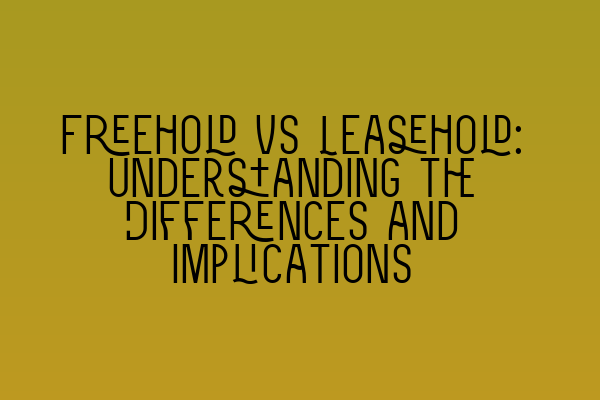Freehold vs Leasehold: Understanding the Differences and Implications
As a property owner or potential buyer, it is crucial to understand the differences between freehold and leasehold ownership. These two terms are often used in real estate, and their implications can have a significant impact on your rights and responsibilities as a property owner. In this blog post, we will delve into the details of freehold and leasehold, highlighting their differences and the implications they have on property ownership.
Let’s start with the basics.
What is Freehold?
Freehold ownership is the complete and absolute ownership of a property and the land it sits on. When you own a freehold property, you have the unrestricted right to use and enjoy the property without any time limitations. You are the outright owner, with full control over the land and the buildings on it.
What is Leasehold?
Leasehold ownership, on the other hand, gives you the right to occupy a property for a fixed period. When you own a leasehold property, you essentially lease the property from the freeholder for a specific number of years, as stated in the lease agreement.
Typically, lease periods for residential properties can range from 99 years to 999 years. Commercial lease periods can vary, sometimes even being as short as 20 years. It is important to note that leasehold ownership is not permanent and will eventually expire, returning the property to the freeholder.
Ownership Rights and Responsibilities
The differences in ownership rights and responsibilities between freehold and leasehold properties are significant and should not be overlooked. Let’s take a closer look at each.
1. Freehold Ownership Rights and Responsibilities
As a freehold property owner, you have complete control over your property. You can make any alterations or modifications to the property, subject to local planning regulations and any relevant environmental or heritage considerations. You are responsible for the maintenance and repair of the property, including the exterior and common areas (if applicable).
2. Leasehold Ownership Rights and Responsibilities
As a leaseholder, your rights and responsibilities are slightly different. While you have the right to occupy and use the property, any major alterations or modifications may require the consent of the freeholder. Additionally, leaseholders are usually required to pay an annual ground rent to the freeholder. Moreover, leaseholders may also be responsible for maintenance fees, service charges, and insurance premiums, contributing to the upkeep and management of the building and common areas.
Lease Extensions and Enfranchisement
Leasehold ownership comes with some limitations, including the lease terms and the eventual expiry of the lease. However, there are processes in place to help leaseholders extend their leases or even acquire the freehold. These processes are known as lease extensions and enfranchisement.
A lease extension allows you to extend the term of your lease, giving you continued occupancy of the property for an extended period. Enfranchisement, on the other hand, allows leaseholders to collectively purchase the freehold of the building, effectively becoming freeholders themselves.
It is important to understand the terms and conditions for lease extensions and enfranchisement, as they vary depending on the jurisdiction and specific circumstances. Seeking legal advice from a qualified solicitor who specializes in property law is crucial to navigate these processes successfully.
Implications for Property Buyers
When purchasing a property, understanding whether it is freehold or leasehold is essential. Freehold properties generally offer greater flexibility and control, as well as potential appreciation in value over time.
Leasehold properties can also be an attractive option, especially for those looking for a lower entry price. However, it is important to consider the length of the lease, any potential ground rent increases, and the ongoing maintenance costs associated with leasehold ownership. Additionally, lenders may have specific criteria for lending on leasehold properties, so it is essential to consult with a mortgage advisor who can guide you through the process.
Conclusion
In summary, the differences between freehold and leasehold ownership are significant, impacting your rights, responsibilities, and long-term prospects as a property owner. Freehold ownership provides complete control and ownership, while leasehold ownership offers the right to occupy a property for a fixed period.
Whether you are buying a property or considering lease extensions and enfranchisement, it is important to seek professional advice from a qualified solicitor specializing in property law. They can guide you through the legal complexities and ensure that you make informed decisions regarding your property ownership.
At SQE Property Law & Land Law, our dedicated team of solicitors understands the intricacies of freehold and leasehold ownership. We can provide expert advice and guidance to help you navigate the ever-changing landscape of property law.
If you found this article informative, you might be interested in reading the following related articles:
– Misrepresentation in Contracts: Unveiling Deceptive Practices
– A Closer Look at SQE Contract Law Syllabus
– SQE Contract Law: Analyzing Landmark Cases and Influential Judicial Decisions
– Understanding Contractual Capacity: Rights and Limitations
– Interactive SQE Mock Tests for Contract Law: Test Your Knowledge
Feel free to explore our website for more informative articles and resources on property law. Should you have any questions or require legal assistance, please do not hesitate to contact us.
